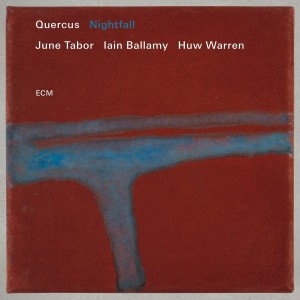 I was gobsmacked when I came across Quercus’s first, self-titled, album a couple of years after its 2013 release. The combination of June Tabor’s husky-silky delivery of largely traditional songs in a jazz setting that was somehow lush but also stripped-down was one that hit many of my sweet spots. Now the trio of Tabor, Iain Bellamy on saxophones and Huw Warren on piano has a second release from the Munich-based label ECM.
I was gobsmacked when I came across Quercus’s first, self-titled, album a couple of years after its 2013 release. The combination of June Tabor’s husky-silky delivery of largely traditional songs in a jazz setting that was somehow lush but also stripped-down was one that hit many of my sweet spots. Now the trio of Tabor, Iain Bellamy on saxophones and Huw Warren on piano has a second release from the Munich-based label ECM.
It’s a similar but different affair. The focus again is mainly on traditional folk songs, but this time there are some diversions from that program into modern folk and other fare.
The other fare includes four pieces that most listeners will already be familiar with and are therefore perhaps more risky for this type of interpretation. Never one to shy from challenging her listeners, Tabor opens with one of them, a rendition of the Robbie Burns chestnut “Auld Lang Syne.” (She also opened Quercus’s first album with a Burns-associated song, “Lassie Lie Near Me.”) It has become something of an odd musical touchstone in Western culture, a song that looks resolutely backward that is sung at the beginning of each new year, a paradox that Tabor embraces by placing this in the first position. It’s reharmonized, as they say in the jazz world, to a tune that’s less sentimental and less obvious than the one we all drunkenly sing on the stroke of midnight. And of course Tabor includes the other verses, giving herself and the players a chance to explore things a bit.
The other cover songs include Stephen Sondheim’s “Somewhere,” also known as “There’s a Place For Us” from West Side Story, which finishes the album nicely; the jazz standard “You Don’t Know What Love Is” and Bob Dylan’s “Don’t Think Twice.” The latter is especially risky because everyone knows it, but Tabor with her supple delivery and mature perspective delivers it almost anew.
I’m at a loss to recommend one or two of the traditional songs this trio delivers. “Once I Loved You Dear (The Irish Girl) is a heart-rending ballad of a lass who’s lad has gone to America and forgotten about her; the Somerset folk song “On Berrow Sands” echoes the songs of the gulls, “Away, keep away, the gulls do cry,” warning sailors away from the treacherous tides of the Bristol Channel; “The Manchester Angel” somberly delivers the old tale of a soldier falling in love with a local lass during England’s Civil War period. But if I had to choose, I’d point you to “The Cuckoo,” a heart-rending Gypsy tale of misplaced love that leads to single parenthood, inspired by the singing of Dorset gypsy Queen Caroline Hughes and set to a familiar tune.
Don’t overlook the instrumental pieces, Warren’s pastoral “Christchurch” on which Bellamy plays a lyrical soprano; and Bellamy’s lush ballad “Emmeline” on his lush tenor.
My only criticism of Nightfall is its spring release. As with its debut, this music is autumnal. Hard to focus on, in fact, as spring was breaking and now, in the height of summer here in the northern hemisphere. I plan on enjoying it doubly as the days shorten and the nights cool. And even now I keep going back to those bookends, the hopefully sad “Auld Lang Syne” and the sadly hopeful “Somewhere,” which show that the pain of untimely love is a common thread through our poetry and music. And here we have it in lyrics from two of the greatest of vastly different centuries, interpreted by one of our time’s top songstresses.
(ECM, 2017)
